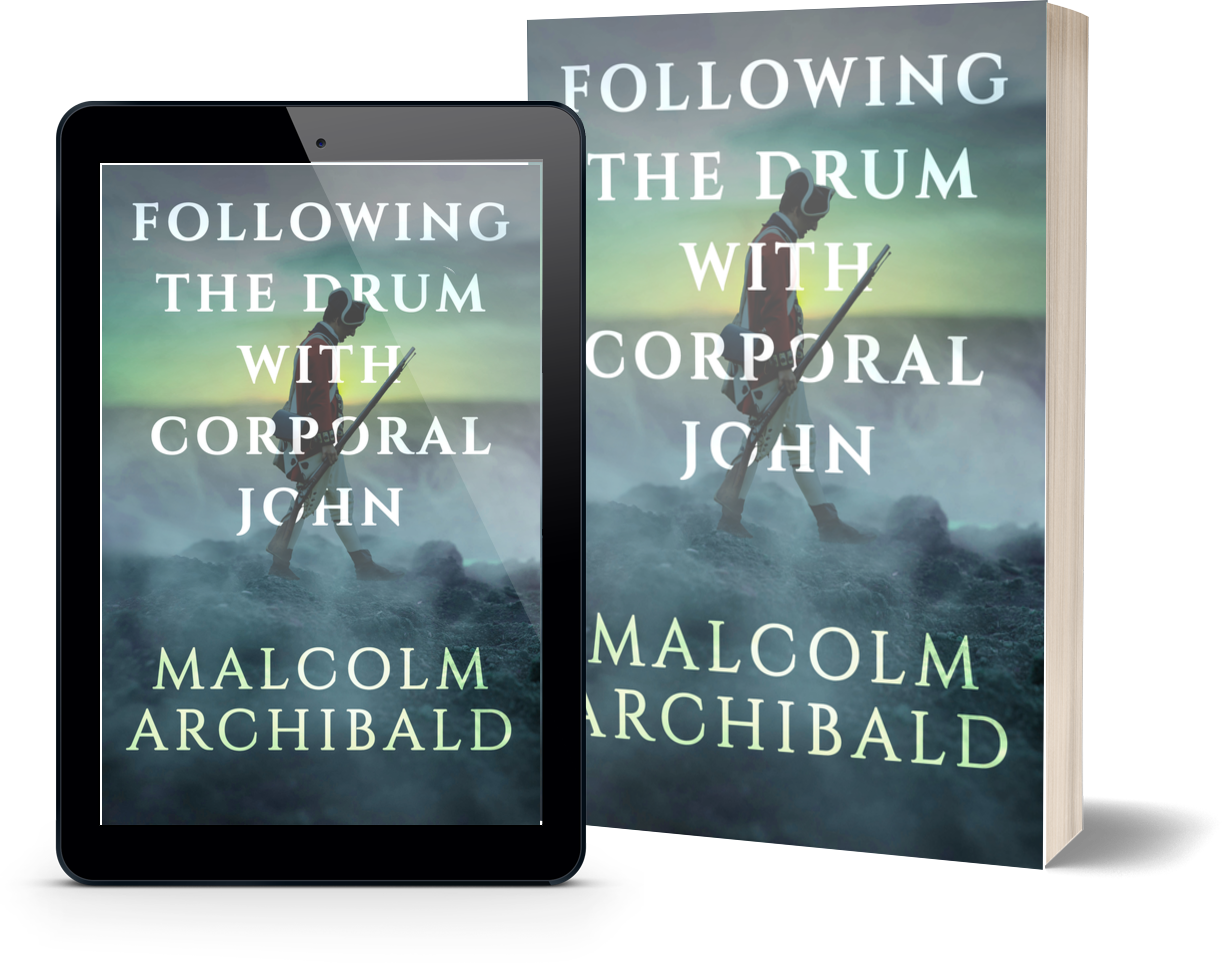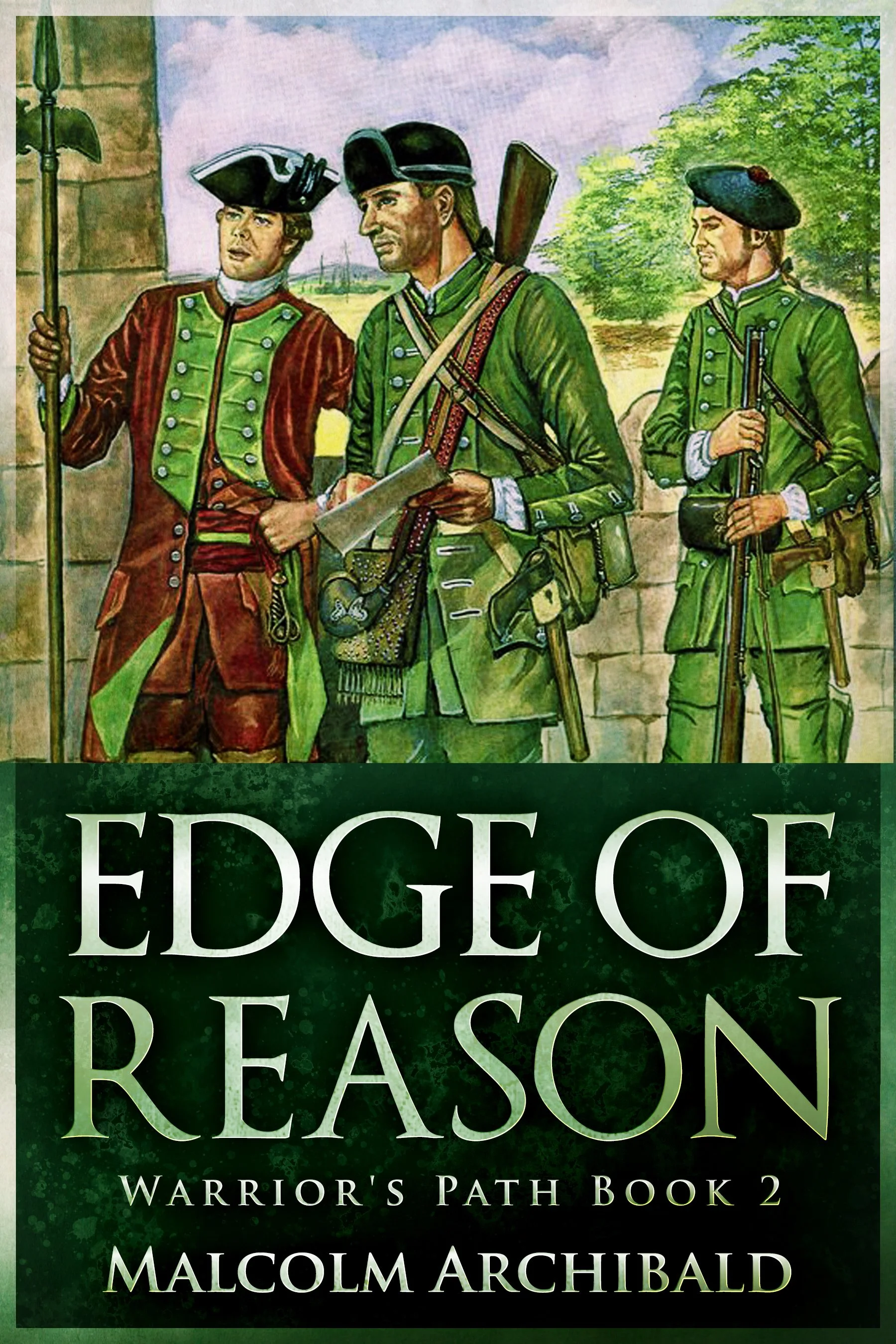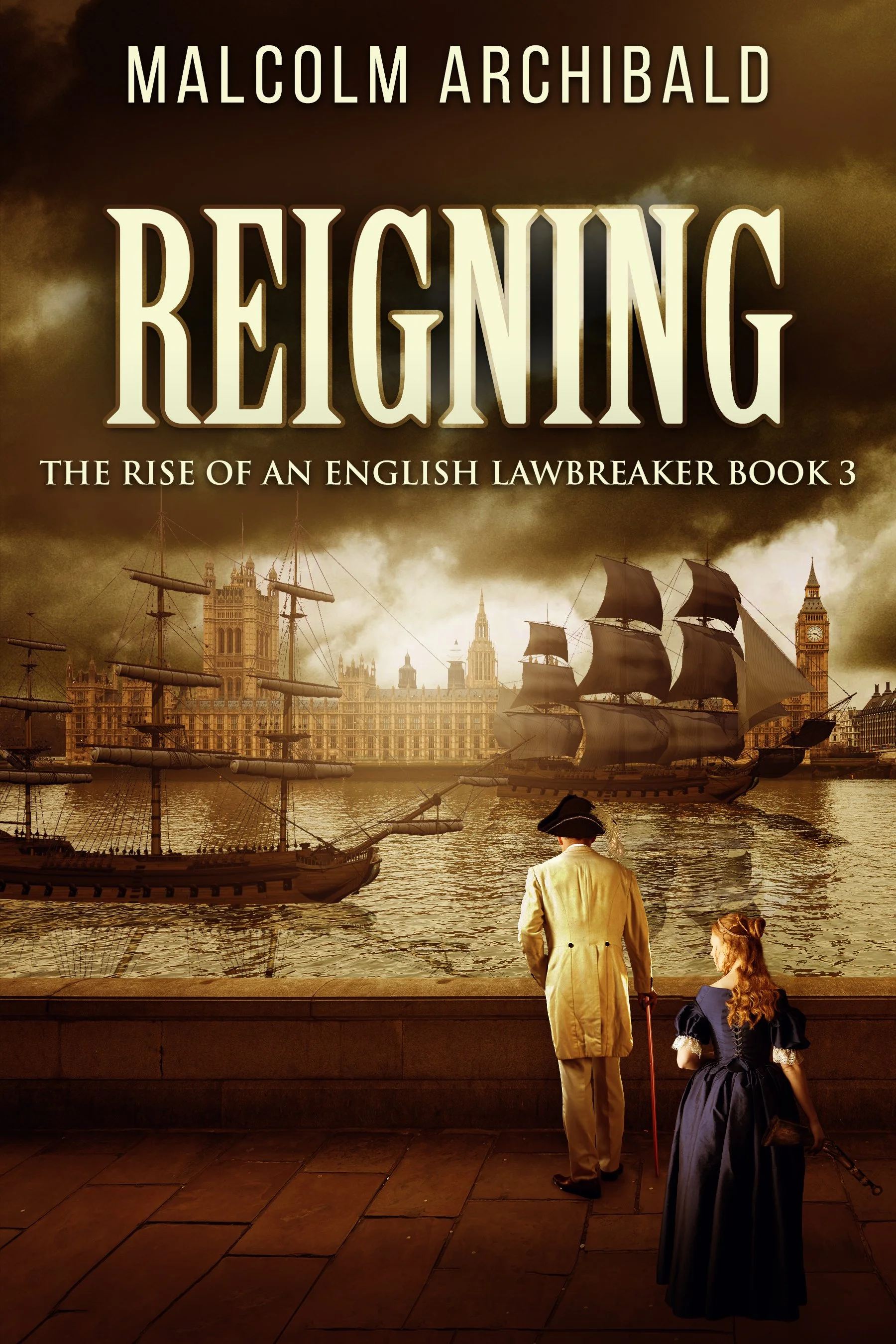Following the Drum with Corporal John
Book summary
Following the Drum with Corporal John is a gripping historical tale set in Scotland in 1701. After escaping slavery, Davie Flockhart joins the army, but his past haunts him as a relentless nobleman seeks his return. Amid fierce battles and camaraderie, Davie forges bonds and dreams of freedom, all against the backdrop of the War of the Spanish Succession.
Excerpt from Following the Drum with Corporal John
CHAPTER ONE
EDINBURGHSHIRE, SCOTLAND, OCTOBER 1701
Flockhart stumbled and fell, with the earth frosty and cold beneath him. He lay for a moment and looked up to the dark sky. Bright stars glittered like a million eyes watching him, with a scimitar moon glowing above the ridge of the Pentland Hills. An owl called somewhere, with its mate quickly replying, the sound eerie.
“Davie!”
Flockhart ignored the voice. He lay still, savouring the peace and the feeling of fresh air across his battered body. He stretched out, saying nothing.
“Davie! Come on, man!”
Flockhart lifted his head, looked around, and slumped down. His fingers curled around a patch of crisp grass.
The voice sounded again.
“Hell mend you, then, David Flockhart! Stay where you are and freeze, damn you.”
Flockhart peered through the strands of lank grass, watching the men slump away. Round-shouldered, exhausted, with ragged, filthy clothes covering battered, dirty bodies, they looked less than human. They were two-legged animals suited only for labouring until they died of fatigue, accident, or disease. They knew nothing better than work and suffering.
Don’t go back.
The thought eased into Flockhart’s mind.
Don’t go back again.
As it gleamed within his brain, the idea betrayed everything and everybody he had ever known. It was an intrusive nugget that he savoured, holding it to him as a secret he could never share.
I failed the last time I tried. Where would I go?
Anywhere is better than here. Anything is better than this.
Flockhart saw his colleagues slump into the collection of hovels they called home, the damp-infested huts that clung like ugly parasites to the rich Lowland soil. He heard the voices raised in discordant clamour, heard a woman’s eldritch laughter and the roar of a man, and then a door opened, allowing fire-gleam to escape. Flockhart saw the interior of the hut, the bundle of rags for a bed, the tousle-haired, filthy infants fresh from their stint down the pit, and then the woman kicked the door shut. Darkness again, with the discordant yelling of marital disharmony.
Don’t go back.
Run away.
A dog barked, joined by others in a snarling, howling cacophony that ended in high screams when a man began swearing, accompanied by the thumps of savage kicks. A woman laughed, a door opened, and a dog fled outside howling. Somebody threw a bottle after it and slammed shut the door.
Don’t go back.
Flockhart lay still with the idea fluttering within his head. Until the previous month, he had never contemplated anything other than his present life. He knew nothing else and nobody else except the men and women with whom he worked. He only knew the limited orbit of his existence, a score of names, and the never-ending toil under the earth’s crust.
Run.
Run.
Run.
Flockhart crawled backwards along the rutted track with no idea except to escape without anybody seeing him. When he judged himself safe from casual observation, he rose, turned, and ran. Flockhart moved clumsily, sliding over the slippery ground, running without direction or thought. He wanted only to put distance between him and the pit.
Run, Davie, run!
When his legs were weak, and the breath rasped in his throat, Flockhart stopped. He slumped to the ground, looking around. He did not know where he was, except he had never been so far from the pit. The landscape was unfamiliar under the wan moonlight, large fields enclosed by frost-rimmed drystone dykes, with a line of neat, stone-built cottages near a larger farmhouse. Flockhart saw a glow in the sky to the north and guessed it emanated from the lights of a town. He had heard of a city called Edinburgh, although he had never visited or imagined he ever would.
The weariness of a long day’s work, followed by the stress of flight, overcame Flockhart. He rolled into the lee of a wall, found a patch of soft grass, and closed his eyes. He knew he would wake well before dawn, as he had done all his life. The cold was irrelevant; he had never known anything except hardship.
Flockhart woke hungry, as always. He looked around, momentarily unsure of his surroundings. He heard the clucking of hens, guessed they were in a nearby barn, and moved towards the stone-walled building. The door was closed but not locked. Flockhart pushed it open, ignored the clamour of disturbed hens, grabbed a couple of eggs from the ground, and fled before the farmer appeared.
A dog barked, awakened by the sound of disturbed fowls. Flockhart ducked his head and ran, stumbling over the rough ground. When he thought himself sufficiently far away, he sat in the shelter of a wall. Glancing around, Flockhart ate the eggs raw, washed them down with water from a fast-flowing river, and continued, head down and legs already aching. He headed for Edinburgh, unsure what he would do when he arrived and already regretting his decision. Flockhart hesitated, wondering if he should return; although the consequences would be unpleasant, it was a life he understood, the only life he knew.
“Hey! You!” A harsh voice broke the morning’s bird chorus. “Thief!”
Flockhart saw three men, presumably from the farm, with two carrying heavy sticks. He ran without thought, blundering across fields, stumbling over drystone dykes and staggering over newly ploughed land. A herd of dun-coloured cattle scattered before him, their hooves thundering hollowly on the ground. The shouting grew fainter, and Flockhart glanced over his shoulder to see the men standing at the edge of the field, watching. One shook an impotent fist, mouthing meaningless threats.
Flockhart hurried on, passing through a small village where thatched cottages huddled beside a simple kirk, and men watched him suspiciously. He pulled up his shirt to hide his neck, ducked his head, and hurried on. A group of women around a well stopped gossiping as he passed, and a cart creaked from a side street, drawn by a bare-ribbed horse. Flockhart hunched his shoulders and shuffled onwards, aware the good neighbours despised his type.
I should have remained at the pit. I don’t belong in this outside world.
Flockhart did not know how long he had walked. Inured to hardship, he ignored the ache in his legs and kept moving. Flockhart grabbed a towel from a clothesline to wrap around his neck and stopped in mid-afternoon when Edinburgh unrolled before him. He had seen the castle from a distance, but now the size of the city daunted him.
I didn’t know there were so many people in the world.
The great bulk of Arthur’s Seat rose over eight hundred feet to a bruised grey sky, with Edinburgh’s streets and tall tenements emerging through the smoke reek of a thousand chimneys. The city stretched from the castle on its volcanic plug to Holyrood Palace a mile down the people-congested ridge. Flockhart viewed the tall, dark tenements rising unbelievably high and wondered what sort of place it was, so much larger than the tiny pit settlements he knew.
Wrapping the towel tightly around his neck, Flockhart moved on, disregarding the curious glances of the increasing number of people he passed as he neared the city. The houses grew more numerous as he approached, the traffic busier, with carts, horses, and the occasional carriage. Flockhart bowed his head when he saw the latter in case his owner was searching for him. He kept in the shadows, ill-at-ease, suspicious of every casual glance and unsure what to do next.
Flockhart entered Edinburgh from the south, staring open-mouthed at the number and scale of the tenements and the crowds in the streets. People of all descriptions and classes mingled with a babble of noise and smells that assailed Flockhart’s senses. He heard the rattle of drums and watched men in colourful clothes encouraging passers-by to join them in the alehouses and taverns, but he decided they could not mean him and moved on. Flockhart passed a life-size model of a red-coated man outside a roaring tavern, saw a well-dressed man looking at him, and moved hurriedly on. He pulled the towel tighter around his throat, stepped into the street to escape the crowds and flinched when a cart nearly ran him down.
“Get out of the way, you country Jock!” the driver snarled, glaring at him.
“That was close!” A slender man in a brilliant red coat guided Flockhart onto safer ground. “Are you all right, my friend?”
“I’m all right,” Flockhart said, freeing his arm from the slender man’s grip.
“You look like you need a drink,” the man said, smiling broadly.
Flockhart felt instant suspicion. Strangers did not buy him a drink. Instead, they avoided men like him. “I’m all right,” he repeated, ensuring the towel covered his throat.
“I’m paying,” the man was around thirty-five, Flockhart estimated, with a nut-brown face and bright, hard eyes. “Josiah Nisbet.”
“David Flockhart,” Flockhart replied cautiously.
The tavern was busy with men crowded around tables as busy barmaids carried tankards of thick beer and glasses of spirits. Nisbet guided Flockhart to a corner table and ordered two tankards of ale and two glasses of rum.
“Relax, David,” Nisbet said. “Have a drink.” He drank deeply from his battered pewter tankard.
Flockhart glanced around the room. He was not used to being surrounded by strangers. He watched the door, fearful that Lord Eskbank might enter.
“You’re not an Edinburgh man, are you?” Nisbet said.
“No,” Flockhart agreed. He measured the distance to the exit, ready to run if challenged.
“You’re a countryman.” Nisbet pulled at his tankard, eyeing Flockhart. “Drink, man; it’s free!”
Flockhart lifted his tankard. The ale was thick and cool, welcome after his recent exertions. He drank slowly, keeping his eyes mobile.
“That’s the way.” Nisbet grinned at him. “A countryman, but not a farmer. A carter, perhaps?”
“No,” Flockhart said, disliking the direction the conversation was taking. He adjusted the towel around his neck and placed his tankard on the much-scarred table. A group of men watched him, openly grinning.
Nisbet looked up as another man pushed through the crowd to join them. “Here’s Corporal Junar.”
Corporal Junar was a stocky, broad-faced man wearing the same type of scarlet jacket as Nisbet. He dragged over a stool and sat beside Flockhart. “Good day, young fellow.”
“Good day,” Flockhart replied. Corporal Junar? Is he a soldier?
“Corporal Junar, meet my new friend, David Flockhart, who was nearly killed by a cart a short time ago.”
“Dangerous things, carts,” Junar said, smiling. “You look like you’ve been on the wrong end of a hard time, David.”
Flockhart realised his clothes were more ragged and his appearance more poverty-stricken than his companions or anybody else in the inn. He swallowed more of his ale, saying nothing.
“You need a change of fortune, my friend,” Nisbet said. “You need a life with regular food and pay, good friends, travel and the chance to make bounty money.”
“And women,” Junar added. “Women who flock to you because of who you are.” He laughed good-humouredly. “Flocking to David Flockhart, eh? I had not intended to say that.”
“And clothes,” Nisbet looked pointedly at Flockhart’s filthy rags. “Two new sets of clothes every year. How would you like that, Davie?”
Flockhart smiled. “I’d like that fine,” he said. “Are you soldiers?”
“We are,” Junar admitted freely. “I am a corporal, as Josiah told you, and he is a private. Sergeant Dunn is around somewhere.”

















Praesent id libero id metus varius consectetur ac eget diam. Nulla felis nunc, consequat laoreet lacus id.